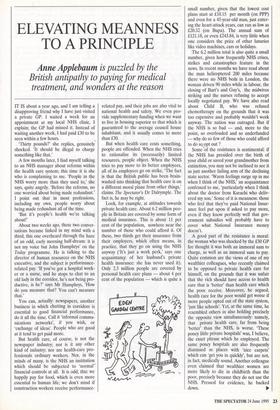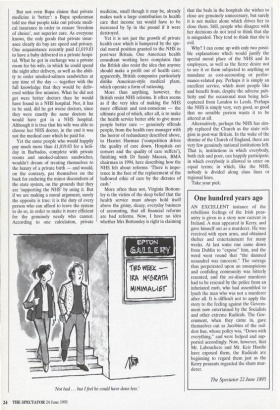ELEVATING MEANNESS TO A PRINCIPLE
Anne Applebaum is puzzled by the
British antipathy to paying for medical treatment, and wonders at the reason
IT IS about a year ago, and I am telling a disapproving friend why I have just visited a private GP. I waited a week for an appointment at my local NHS clinic, I explain; the GP had missed it. Instead of waiting another week, I had paid £30 to be seen within a few hours.
`Thirty pounds?' she replies, genuinely shocked. 'It should be illegal to charge something like that.'
A few months later, I find myself talking to an NHS manager about reforms within the health care system; this time it is she who is complaining to me. 'People in the NHS worry more than they used to,' she says, quite angrily. 'Before the reforms, no one worried about being made redundant.' I point out that in most professions, including my own, people worry about being made redundant.all of the time.
`But it's people's health we're talking about!'
About two weeks ago, these two conver- sations became linked in my mind with a third, this one overheard through the haze of an odd, early morning half-dream: it is not my voice but John Humphrys' on the Today programme. He is talking to the director of human resources on the NHS executive, and the subject is performance- related pay. 'If you've got a hospital work- er or a nurse, and he stops to chat to an old lady in the corridor, he's not being pro- ductive, is he?' says Mr Humphrys, 'How do you measure that? You can't measure that.'
You can, actually: newspapers, another business in which chatting in corridors is essential to good financial performance, do it all the time. Call it 'informal commu- nications networks', if you wish, or `exchange of ideas'. People who are good at it tend to get paid more.
But health care, of course, is not the newspaper industry; nor is it any other kind of industry; nor are health-care pro- fessionals ordinary workers. Nor, in the minds of many, is the NHS an institution which should be subjected to 'normal'. financial controls at all. It is odd, this: we happily pay for food, which is even more essential to human life; we don't mind if construction workers receive performance- related pay, and their jobs are also vital to national health and safety. We even pro- vide supplementary funding when we want to live in housing superior to that which is guaranteed to the average council house inhabitant, and it usually comes to more than £30.
But when health care costs something, people are offended. When the NHS tries to rationalise its (necessarily) limited resources, people object. When the NHS tries to pay more to its better employees, all of its employees go on strike. 'The fact is that the British public has been brain- washed into thinking that health care is on a different moral plane from other things,' claims The Spectator's Dr Dalrymple. The fact is, he may be right.
Look, for example, at attitudes towards private health care. About 6.2 million peo- ple in Britain are covered by some form of medical insurance. This is about 11 per cent of the population, nowhere near the number of those who could afford it. Of these, two thirds get their insurance from their employers, which often means, in practice, that they go on using the NHS anyway (`H's just a work perk,' says one acquaintance of her husband's private health insurance: she has never used it). Only 2.3 million people are covered by personal health care plans — about 4 per cent of the population — which is quite a small number, given that the lowest cost plans start at £10.15 per month (on PPP) and even for a 45-year-old man, just enter- ing the heart-attack years, can run as low as £20.32 (on Bupa). The annual sum of £121.18, or even £243.84, is very little when one considers the price of other luxuries like video machines, cars or holidays.
The 6.2 million total is also quite a small number, given how frequently NHS crises, strikes and catastrophes feature in the news. In recent months we have read about the man helicoptered 200 miles because there were no NHS beds in London, the woman driven 90 miles while in labour, the closing of Bart's and Guy's, the midwives striking and the nurses refusing to accept locally negotiated pay. We have also read about Child B, who was refused chemotherapy on the grounds that it was too expensive and probably wouldn't work anyway. The nation was outraged. But if the NHS is so bad — and, more to the point, so overloaded and so underfunded — why do so few of those who could afford to do so opt out ?
Some of the resistance is sentimental: if the NHS has presided over the birth of your child or saved your grandmother from extinction, you may not be inclined to see it as just another failing arm of the declining state sector. 'Warm feelings surge up in me when I think of the NHS,' an acquaintance confessed to me, 'particularly when I think about the doctor from Karachi who deliv- ered my son.' Some of it is meanness: those who feel that they've paid National Insur- ance feel put upon if asked to pay more, even if they know perfectly well that gov- ernment subsidies will probably have to cover what National Insurance money doesn't.
A good part of the resistance is moral: the woman who was shocked by the £30 GP fee thought it was both an immoral sum to charge, as well as an immoral sum to pay. Quite common are the views of one ,of my wealthier colleagues, who recently claimed to be opposed to private health care for himself, on the grounds that it was unfair that the rich should have access to health care that is 'better' than health care which the poor receive. Moreover, he argued, health care for the poor would get worse if more people opted out of the state system, `just like schools'. Yet, at the same time, he resembled others in also holding precisely the opposite view simultaneously: namely, that private health care, far from being `better' than the NHS, is worse. 'These poncy little private hospitals' was, I believe, the exact phrase which he employed. The same poncy hospitals are also frequently dismissed as places with 'nice carpets' which can 'get you in quickly', but are not, in fact, medically sound. Another colleague even claimed that wealthier women are more likely to die in childbirth than the poor, precisely because they do not use the NHS. Pressed for -evidence, he backed down. ► But not even Bupa claims that private medicine is 'better': a Bupa spokesman told me that people take out private medi- cal insurance in order to ensure 'freedom of choice', not superior care. As everyone knows, the only goods that private insur- ance clearly do buy are speed and privacy. One acquaintance recently paid £1,019.83 to have a baby delivered in a private hospi- tal. What he got in exchange was a private room for his wife, in which he could spend the night after delivery, as well as the abili- ty to order smoked-salmon sandwiches at any time of the day — together with the full knowledge that they would be deliv- ered within five minutes. What he did not get were better doctors than he would have found in a NHS hospital. Nor, it has to be said, did he get worse doctors, since they were exactly the same doctors he would have got in a NHS hospital. Although it is true that his wife was able to choose her NHS doctor, in the end it was not the medical care which he paid for.
Yet the same people who would happily pay much more than £1,019.83 for a holi- day in Barbados, complete with private rooms and smoked-salmon sandwiches, wouldn't dream of treating themselves to the luxury of a private birth — and would, on the contrary, pat themselves on the back for enduring the minor discomforts of the state system, on the grounds that they are 'supporting the NHS' by using it. But if we are making a moral argument, surely the opposite is true: it is the duty of every person who can afford to leave the system to do so, in order to make it more efficient for the genuinely needy who cannot. According to one calculation, private medicine, small though it may be, already makes such a large contribution to health care that income tax would have to be increased by 5p in the pound if it were destroyed.
Yet it is not just the growth of private health care which is hampered by the spe- cial moral position granted to the NHS in post-war Britain. One American health consultant working here complains that the British also resist the idea that anyone should make a profit out of health care; apparently, British companies particularly dislike American-style medical plans, which operate a form of rationing.
More than anything, however, the British resist NHS reforms. It often seems as if the very idea of making the NHS more efficient and cost-conscious — the ultimate goal of which, after all, is to make the health service better able to give more people better care — genuinely offends people, from the health care manager with the horror of redundancy described above, to Harriet Harman (`competition drives the quality of care down. Hospitals cut corners and the quality of care suffers'), finishing with Dr Sandy Macara, BMA chairman in 1994, here describing how the NHS felt about reforms: 'There is impo- tence in the face of the replacement of the hallowed ethic of care by the dictates of cash.'
More often than not, Virginia Bottom- ley is the victim of the deep belief that the health service must always hold itself above the grimy, sleazy, everyday business of accounting, that all financial reforms are bad reforms. Now, I have no idea whether Mrs Bottomley is right in claiming `Not bad ... but I feel he could have done less.' that the beds in the hospitals she wishes to close are genuinely unnecessary, but surely it is not malice alone which drives her to close them. Still, people who disagree with her decisions do not tend to think that she is misguided. They tend to think that she is evil.
Why? I can come up with only two possi- ble explanations which would justify the special moral place of the NHS and its employees, as well as the fierce desire not to see it or them subjected to anything so mundane as cost-accounting or perfor- mance-related pay. Perhaps it is simply an excellent service, which most people like and benefit from, despite the adverse pub- licity and the occasional man being heli- coptered from London to Leeds. Perhaps the NHS is simply very, very good, so good that no sensible person wants it to be altered at all.
Alternatively, perhaps the NHS has sim- ply replaced the Church as the state reli- gion in post-war Britain. In the wake of the demise of the Church of England, there are very few genuinely national institutions left. That is, institutions in which everybody, both rich and poor, can happily participate; in which everybody is allowed to enter on equal terms; in which, like the NHS, nobody is divided along class lines or regional lines.
Take your pick.



























































 Previous page
Previous page